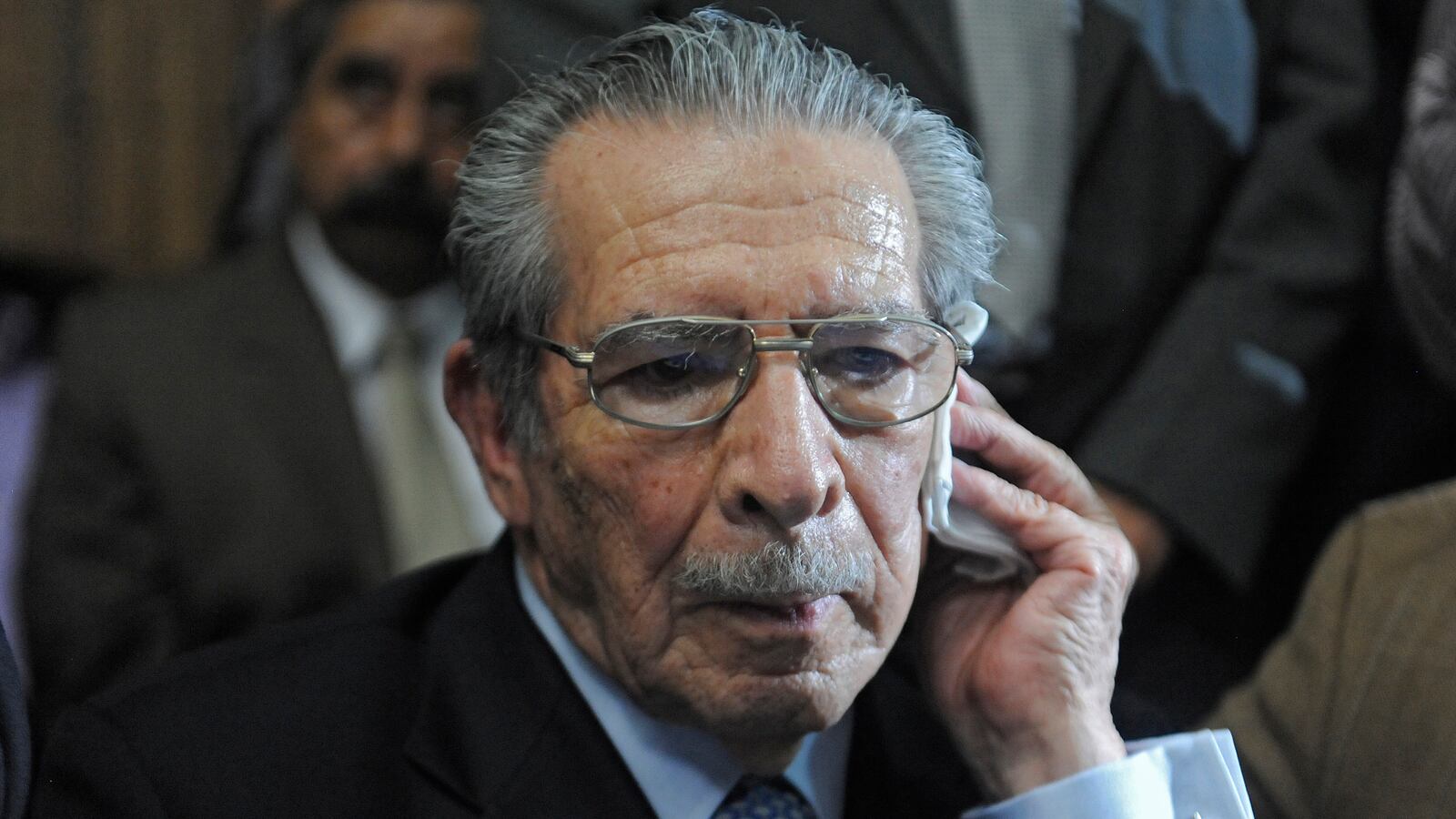Guatemala is no powerhouse. Dwarfed by Mexico to the north, this land of 13 million is best known for its impoverished indigenous population, Mayan ruins, vast banana groves, and a bumper crop of dictators. Now all that may be changing.

The country's High Risk Tribunal has just found former army general Efraín Ríos Montt guilty of crimes against humanity and genocide for his role in the 36-year civil war that took more than 200,000 lives and tore this Central American nation apart.
Now stooped and almost vulnerable looking, the 86-year-old former general barely resembles the strongman of three decades ago who railed against the communist menace and unleashed security forces during one of the most violent chapters of the Latin American Cold War.
The historic case has been described as the first time a former head of state has been convicted of genocide by a national court.
Taking power by coup d´état in 1982, Rios Montt fell to another just 17 months later, but in that brief interval he left a heavy bootprint. Along the course of the five-week trial in Guatemala City, more than 100 witnesses told of serial raids in the Guatemalan highlands in which government troops shot up, torched, and even bombarded over a dozen villages. The toll: 1,771 people dead, the vast majority of them members of indigenous Ixil Maya communities.
Rios Montt staunchly defended his actions against what he termed a deadly enemy, and bristled at the suggestion of genocide. "I never authorized, I never signed, I never proposed, I never ordered that a race, ethnicity, or religion be attacked," he protested as the trial wound to a close.
Presiding judge Yassmín Barrios was not impressed. Her three-judge panel found the general guilty of waging a campaign not just of war but of extermination. When the general rose in an apparent attempt to exit the courtroom through a side door, she shouted at him to stay seated as she read the decision.
Barrios sentenced the general to 50 years imprisonment for genocide and another 30 years for crimes against humanity. His former intelligence chief, José Mauricio Rodríguez Sánchez, was cleared of similar charges.
"Rios Montt was aware of everything that was happening and did nothing to stop it, even though he had the power to do so," Barrios read aloud from the ruling. The courtroom packed with family members of victims and human-rights advocates burst into applause. And while Rios Montt has filed for appeal, he was ordered to start serving his sentence immediately.
It was a powerful conclusion to a case that took prosecutors over a decade to build and that many Guatemalans doubted would ever see its day in court. Human-rights advocates were ecstatic. "In a country like Guatemala, where indigenous people historically are not seen as citizens and long used to abuses and the impunity of the powerful, this is as close as you can get to a miracle," says José Miguel Vivanco, Americas director for Human Rights Watch, an advocacy group. "The verdict is a feat of epic proportions."
The case also helps turn the page of one of the most ignominious chapters of U.S. foreign policy, when Washington waged the Cold War through proxy regimes in Latin America, often looking the other way when atrocities and excesses resulted. In 1999, President Bill Clinton broke with that complicity when he traveled to Guatemala and publicly apologized for the U.S.'s role in the dirty war.
The proceedings in Guatemala City were not lost on the rest of the hemisphere, where several nations including Brazil, Argentina, Colombia, and Uruguay are pulling back the veil on the recent past to review acts of violence committed during the last few decades of civil strife, guerrilla insurgency, and backlash by dictators.
"Until now, many of these crimes have been shielded by amnesty laws that were passed by societies in an attempt to put divisive issues behind them," says Michael Shifter, president of the Inter-American Dialogue. "After Guatemala, we may see more countries moving to reopen cases."
Ultimately, the outcome in each of these countries turns on the national mood and internal political rivalries, as competing groups measure their forces and vie for the chance to rewrite history.
The deeds of Argentina´s 1976-1983 dirty war came under scrutiny shortly after the collapse of the military junta, disgraced by its defeat in the Falklands/Malvinas war with Great Britain in 1982. Once seen as an anti-terrorist hero, former Peruvian dictator Alberto Fujimori spent years on the lam before he was arrested in Chile and sent home to jail in Peru in 2007, where civil rights had flourished with the renascent Andean democracy.
It took a decade and an extradition order by Spanish judge Baltasar Garzón before former Chilean dictator Augusto Pinochet was brought to justice in his native country, in 2000. By contrast, in Brazil, where a blanket amnesty shields dirty-war crimes committed before 1979, the ongoing Truth and Reconciliation hearings will review plenty of grisly tales but is unlikely to lead to criminal prosecutions.
Whether or not the Rios Montt verdict will continue to resonate throughout the rest of the region is an open question. "Every time that something similar has happened in Latin America, it is because political conditions have changed," says Vivanco. "A former leader, yesterday's caudillo, loses key support, leaving a nation ripe for this kind of prosecution.
Some analysts argue that Rios Montt, aging and unloved, was a prime candidate for the pillory. "Rios Montt had fallen from favor. Everyone knew he was at the center of the repression," says Riordan Roett, a Latin America scholar at Johns Hopkins University. "In some ways, he was a sitting duck."
And yet, survivors and civic groups in Guatemala are under few illusions. Backed by a team of attorneys and with powerful interests in business and the military looking on, Rios Montt is digging in. Most observers are bracing for a drawn-out appeals process in the Rios Montt case, which could end up in the Supreme Court or even the Constitutional Court, where matters of constitutional law are argued.
What is new and remarkable for the onetime generalissimo is that he will have to wage this war from behind bars.






